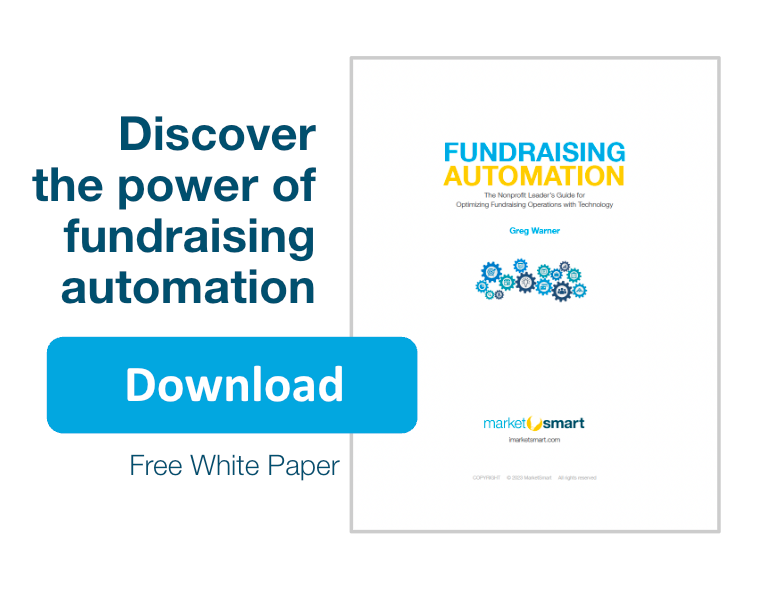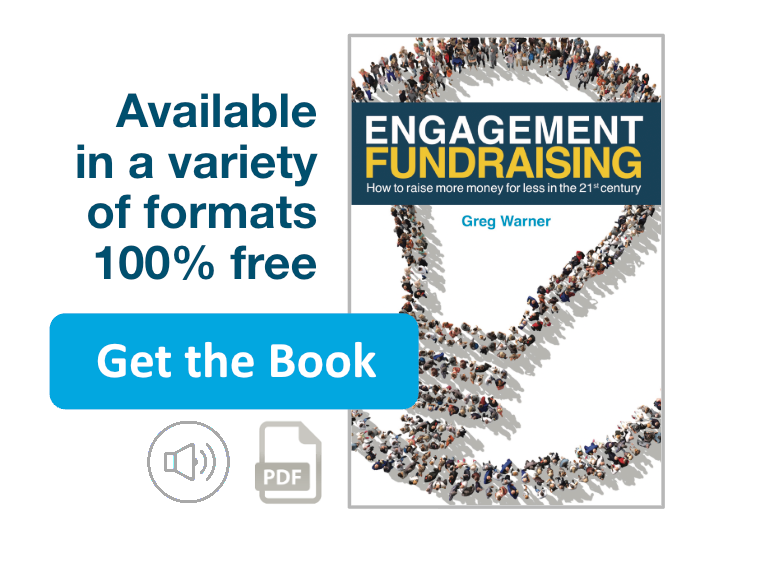I know, it’s frustrating. You want to thank them but they won’t respond to your outreach.
First things first. There are a bunch of reasons why they won’t reply. Perhaps they are private people. Perhaps they’re afraid you’ll ask them for more money. Or, maybe they like to engage with your organization and its mission, but YOU are an entirely different story.
They have their reasons. But still, your job is to build relationships with supporters to ensure that their legacy intentions become realized (revenue). So what do you do?
Let’s take a step back for a minute.
Before we go any further, I have to remind you that this isn’t about you and it isn’t about your boss either. No! For #@%&!’s sake, it’s all about them— the donor.
Gain some empathy. Put yourself in their shoes. Recognize that, when they encounter your outreach, they’re going to ask themselves, “Why should I take this call or respond? What’s in it for me?”
Give to them first.
Never forget that people want value, especially when they are dealing with strangers. In this case, if they don’t understand what value they’ll gain from an engagement with you, they won’t lean in to accept it.
Therefore, the only way to get them to engage is to provide value and make it easy for them to comprehend and appreciate.
What should you give them?
In many cases, when a supporter notifies you that they left your organization in their estate plan, I think you should offer them a donor survey. It’s a fabulous ‘opaque’ offer that doesn’t scream, “I want to confirm your plan, document it (for my boss) and learn more about the details of your gift!….. like how much????…… And, oh by the way, how are you feeling???” 😉
At MarketSmart, we call this type of survey an intends survey since these folks said they intend to leave a gift). It’s an easy offer to create and distribute. In fact, if you want to examine one, I encourage you to schedule a time to talk with one of our Solutionists.
Remember, your immediate goal should be to get them to engage.
I know, your boss wants to document the gift. That’s great. But what does the donor want? That’s the question you need to ask yourself. Do they want to document the gift as much as you want them to? Probably not. That’s why you’ve got to give them a good reason to engage first.
Only then, once they’ve engaged, will you have a chance to build a relationship and finally document the gift.
Safety leads to engagement.
A survey is safe for them. It provides an opportunity for them to engage in arms-length dialogue with your organization (not really with you… at least not yet!) at a time and place of their choosing. In it you could ask questions like:
- Why did you make this gift?
- Did you do it to honor or commemorate someone?
- If so, who and why?
- How would you like to be recognized and/or thanked?
- Would you like to be included in our legacy society?
- Are you familiar with the benefits of joining the legacy society (for instance, you’ll be given opportunities to engage with like-minded people)?
- Would you like to share your story so others might do what you did?
- Would you like to disclose the gift vehicle you used and the amount?
- Would you like to be listed in the annual report?
- Etc.
A survey is a win-win. It gives them something (an opportunity to have dialogue, provide feedback, and feel good about themselves for supporting your cause). And, it gives you valuable information you can use later to enhance your follow-up communications making your calls, letters, and emails exponentially more personalized and relevant— for them.
Temporarily put aside what your organization wants and give donors what they want instead.
Think about it. This wonderful human being just let you know that they plan to make the ultimate gift to support your cause. That’s amazing. It’s beautiful. It’s magical.
That’s why, unless you already know the supporter well, your outreach should embrace the fact that they might not trust you— yet.
Be empathetic to them. Provide value for them. Offer them an opportunity to engage in dialogue in a way that is appropriate at this stage of the relationship. Then, when they return the survey, use the answers they provide to give to them even more. Provide more value so they’ll engage again.
Finally then, when the relationship feels safe and fair to them, donors will give you what you and your boss want— mark my words.
Related Posts:
- Why you should worry less about reducing overhead and more about delivering value.
- Donor Offer Value Checklist





Your text makes it sound a bit like you’re dealing with a wounded dog. The very few people (sadly) who give charitably to nonprofits through their estates are, for the most part, wisely advised and financially well off. The first thing you might do is stop calling them “donors”; they’re actually real people. You might also suggest that it is the boss’ job to establish the relationship with such a wonderful person, not an underling, no matter the title. If they are remembering you in their estate, I suspect they were a Board member, your hospital cured a family member, they attended your college in the 1940s, etc. There’s a very emotional connection; you should know it. Finally, and perhaps most important, maybe your charitable person really does want to be left alone; they’ve done you a favor by letting you know about their future gift, now honor their wish for privacy. Have the person who should know them best send a SINCERE note every six months asking how they are and reminding them “we’re always here to talk”, and leave it at that.
Thanks for the straight talk, Rick although I’m not sure about the ‘wounded dog’ part… I’m just trying to be empathetic to hardworking fundraisers trying to satisfy their leadership’s demands. And, many of our customers have hundreds or even thousands in their legacy societies thanks to these types of disclosures (of course the result of using our system). So, I don’t see how a boss can handle building relationships with so many people. Especially when many of them don’t want one-to-one relationships with said ‘boss’. Nonetheless I very much appreciate your insights! A lot of them are right on-point. Thanks again.
Sometimes it is a good idea to acknowledge how important it is to document which area of the organization the estate gift will benefit. The donor may have a passion for a particular direction of the cause, and you as a gift officer are contacting them to make sure that the language in their estate plans will be honored in the future. They might be unaware of the long term impact that the estate gift can provide in perpetuity if it is at an endowment level for example.
These are great points. Thanks for adding them Mark.
Excellent article, Greg. Just another reminder that the donor comes first! We are here to serve them.
Right on Scott! They are the heroes!!
Greg, I’ve been reading your post for years and usually agree with what you say. But this post is FAR AND AWAY the single most useful post you have ever done! My only suggestion would be that the questions as posted don’t quite lend themselves to a survey. Every one of them is open-ended and would require a written response. That might be more work than they wish to do.
So what if it were truly formatted as a survey? For example:
Why did you make this gift?
__ Honor or commemorate someone.
__ My relatives are spendthrifts and I want to spite them. (Just kidding…)
__ XYZ changed my life and I want to give back.
Etc.
Of course, such a survey should have lots of followup questions and room to leave additional info, so the person can get as emotive as they would like — but it wouldn’t require a big time investment if they don’t want to make it.
Usually the direct question of “Why .. . . ?” triggers a defensive posture, even in a friendly exchange. I never frame a question that way.
Also – I think it’s important to connect with people who have made the plans or intend to do so soon. You may be able to document a gift, but there may be snags that would keep the gift from being realized.
I’m reminded of a lady, we’ll call her Beatrice, who was inspired by a “thank you note” campaign to go to her lawyer and put our organization in her will. It was her house, and that was pretty much it. In the follow-up meeting to learn more, I found out that Beatrice, aged 72, was really looking forward to moving to an upscale retirement community – and she was going to use the house as the source of wealth to pay for that. Even though she had a competent estate attorney, that person wasn’t looking at the entire situation, and our organization wasn’t going to get ANYTHING if we didn’t find out what Beatrice really wanted to do for our organization. Great case study with lots of good planned giving techniques for the “middle market” philanthropist. the POINT is: Don’t be so caught up in getting the amount of a future gift that you don’t consider whether or not the gift will actually be realized! Listen to the story first!!!
Excellent points. Thanks Laura.